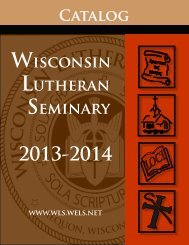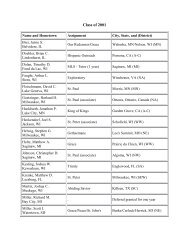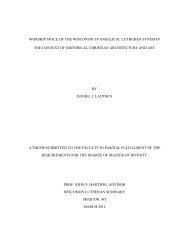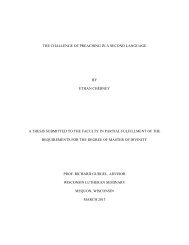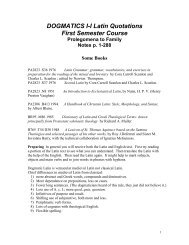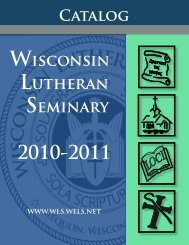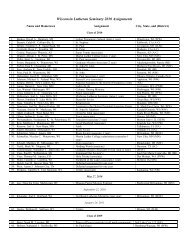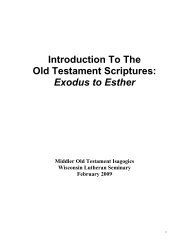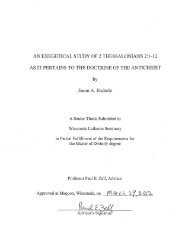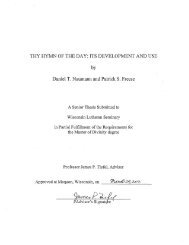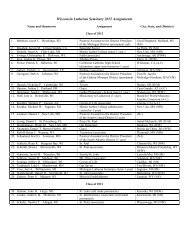Untitled - Wisconsin Lutheran Seminary - WELS
Untitled - Wisconsin Lutheran Seminary - WELS
Untitled - Wisconsin Lutheran Seminary - WELS
You also want an ePaper? Increase the reach of your titles
YUMPU automatically turns print PDFs into web optimized ePapers that Google loves.
• τὸ κατέχον is not a power that restrains but one that exercises his power on Satan’s<br />
behalf.<br />
• This power that holds back, that “seizes” or “possesses,” implies some form of demon<br />
possession. 66<br />
While many interpretations have been made, no evidence exists to prove one over another. In<br />
the end one cannot know for certain. David Kuske favors one interpretation in his People Bible<br />
commentary: “That ‘thing,’ which was a matter of common knowledge to the Thessalonians,<br />
was the Word of God and the believers’ love for that Word.” 67<br />
In his own time<br />
This interpretation is quite<br />
agreeable. The neuter could imply the power of the Word while the masculine could refer to<br />
God himself. In keeping with the context of comfort, it is preferable to see this restraining force<br />
as good rather than evil. Also, Paul writes to the Thessalonians that they knew something of this<br />
restraining force. The two things one can be certain that they knew were God’s Word and the<br />
Savior. Yet without Paul’s previous teachings to them, this remains an argument from silence.<br />
What can be determined from Paul’s words is that the “man of lawlessness” had not yet been<br />
revealed at the writing of this letter because of this restraining force.<br />
Paul follows with the phrase εἰς τὸ ἀποκαλυφθῆναι αὐτὸν ἐν τῷ ἑαυτοῦ καιρῷ (“that he<br />
will be revealed in his/its own time”). The preposition introduces an accusative with the<br />
infinitive construction. While there is no nearby antecedent for the accusative masculine<br />
pronoun αὐτὸν, it most likely refers back to the “man of lawlessness.” This is most natural, for it<br />
goes along with the aorist passive infinitive ἀποκαλυφθῆναι. This same verb was used in verse<br />
three to speak about the revelation of the “man of lawlessness,” and the same words will come<br />
up once again in verse eight. A debate arises as to which word this phrase is linked, whether τὸ<br />
κατέχον or οἴδατε. Others will also argue as to whether the εἰς introduces a result or a purpose<br />
clause. Lenski gets to the point when he says, “There is no need for debate. There is no question<br />
about the sense, for the words are quite simple: something is now holding up the revelation of<br />
66 Gene L. Green, The Letters to the Thessalonians (Grand Rapids, MI: Wm. B. Eerdmans Publishing Co.,<br />
2002), 316.<br />
67 David P. Kuske, 1,2 Thessalonians (Milwaukee: Northwestern Publishing House, 1984), 93.<br />
34



